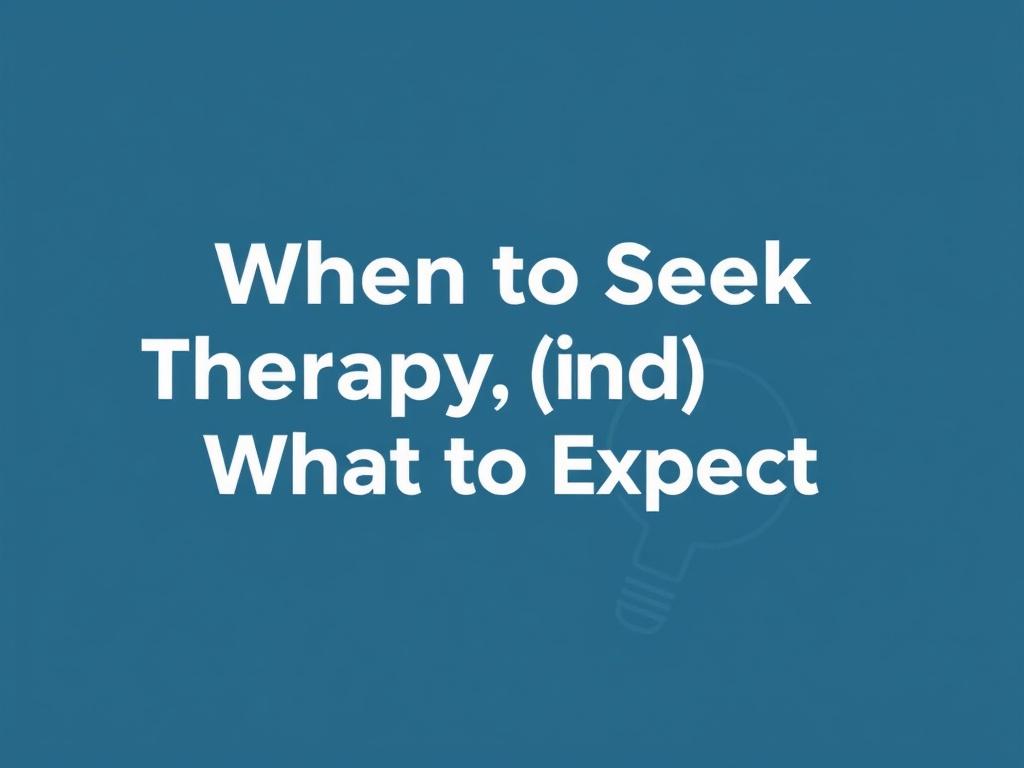Understanding the Importance of Therapy
Therapy is often seen as a last resort, something people turn to only when problems have become overwhelming. However, this couldn’t be further from the truth. Seeking therapy can be a proactive step toward improving your mental, emotional, and even physical well-being. It is a safe space to explore your feelings, gain new perspectives, and develop strategies to navigate life’s ups and downs. But knowing when to seek therapy can sometimes feel confusing—what are the signs? When is it time to talk to a professional? And importantly, what should you expect from the therapeutic experience?
In this article, we’ll explore in depth when to seek therapy and what the therapy process typically involves. We will also discuss common concerns about therapy, debunk myths, and provide helpful information to make your decision easier and your experience richer.
Signs It’s Time to Seek Therapy
Sometimes the need for therapy is obvious, but other times it can be subtle. Life is full of challenges, and while everyone faces stress and struggle, therapy becomes essential when those difficulties start to impact your daily life. Here are some clear signs that it might be time to seek therapy:
- Persistent feelings of sadness or anxiety: Everyone feels down occasionally, but if these feelings last for weeks or months and don’t improve, they may signal something deeper.
- Changes in sleep or appetite: Significant changes in sleep patterns or eating habits can indicate emotional distress.
- Irritability and anger: If you find yourself getting angry more easily or feeling frustrated constantly, therapy can help identify triggers and coping methods.
- Difficulty in relationships: Struggling to maintain healthy connections with family, friends, or coworkers can suggest that underlying issues need addressing.
- Trauma or loss: Experiencing a traumatic event or the loss of a loved one often creates emotional wounds that benefit from professional help.
- A feeling of being stuck: If you feel like you’re going through the motions without joy or purpose, therapy can assist in rediscovering motivation and direction.
- Substance use problems: Using drugs or alcohol to cope with problems may require therapeutic intervention.
If you recognize any of these signs in yourself or someone you care about, it could be a meaningful step to seek therapy. Many people hesitate because they worry their problems aren’t “serious enough.” The truth is, therapy can help at any stage of difficulty, whether you’re facing a crisis or simply want to lead a healthier emotional life.
Common Reasons People Seek Therapy

While the signs above point to when you should seek therapy, understanding common motivations for starting therapy can also clarify what to expect. Therapy is not only for mental illness—it’s for anyone looking to improve their mental health and quality of life.
| Reason for Therapy | Description |
|---|---|
| Depression | Persistent sadness, loss of interest in activities, and feelings of hopelessness. |
| Anxiety Disorders | Excessive worry, panic attacks, and fear that interfere with daily activities. |
| Relationship Issues | Communication problems, conflicts, or challenges coping with breakups or divorce. |
| Life Transitions | Major changes such as moving, changing jobs, or becoming a parent that require adjustment. |
| Grief and Loss | Struggling to cope with the death of a loved one or other significant losses. |
| Stress Management | Feeling overwhelmed by work, school, or personal responsibilities. |
| Self-Discovery and Growth | Wanting to understand oneself better and develop new skills for personal empowerment. |
Recognizing any of these reasons can reinforce the decision to seek therapy. Remember, therapy is a tool for everyone, not just those with diagnosed mental health conditions.
What to Expect in Your First Therapy Session
Walking into a therapy office for the first time can be intimidating. You may wonder what exactly will happen, how much you need to share, and whether therapy will truly help. Understanding what to expect from your initial sessions can ease the anxiety and create a more positive experience.
Building Rapport and Trust
The first session is often focused on building rapport. Therapists want to create a safe, non-judgmental environment where you feel comfortable sharing your thoughts and feelings. You can expect the therapist to ask about your background, your reasons for coming to therapy, and what you hope to achieve.
Assessment and Goal Setting
During early sessions, the therapist will gather information about your emotional state, life situation, and any mental health history. Together, you will discuss goals—what you want to work on during therapy. These goals can be flexible and adjusted as therapy progresses.
Confidentiality and Boundaries
A crucial part of the first session will be discussing confidentiality and boundaries. Therapists explain how your information is protected, any limits to confidentiality (such as risk of harm), and how the therapy relationship functions. Knowing this can help build trust from the start.
Questions for Your Therapist
Don’t hesitate to ask your therapist questions. You might want to know their approach, credentials, or how long therapy might take. Therapy is a collaborative process, so open communication is key.
Types of Therapy You Might Encounter
Therapy isn’t one-size-fits-all. There are many different approaches, and the method your therapist uses will depend on their training and your needs. Here are some common types:
- Cognitive Behavioral Therapy (CBT): Focuses on identifying and changing negative thought patterns and behaviors.
- Psychodynamic Therapy: Explores unconscious patterns and past experiences influencing present behavior.
- Humanistic Therapy: Emphasizes personal growth and self-actualization through compassionate understanding.
- Dialectical Behavior Therapy (DBT): Combines CBT with mindfulness techniques, often used for emotional regulation.
- Family and Couples Therapy: Works with multiple people to improve communication and relationships.
- Holistic and Integrative Therapies: Blends traditional psychotherapy with alternative approaches like mindfulness or art therapy.
If you’re not sure which type of therapy suits you, therapists can explain their approach and adjust techniques to fit your preferences and goals.
How to Prepare Yourself Before Starting Therapy

Starting therapy is a significant step, and some simple preparation can help you get the most out of it. Here are helpful tips to consider:
- Reflect on your reasons: Think about why you want therapy and what you hope to achieve.
- Be open-minded: Therapy can sometimes bring up unexpected feelings; being open helps the process.
- Set realistic expectations: Remember that therapy is a journey, not a quick fix.
- Write down questions or concerns: Having a list can guide your sessions.
- Commit time and effort: Regular attendance and honest communication increase success.
Overcoming Barriers to Seeking Therapy
There are many reasons people hesitate to seek therapy, including stigma, cost, and unsure about the process. Understanding and addressing these barriers can encourage more people to get the help they deserve.
Breaking the Stigma
Mental health stigma remains a major barrier worldwide. Many still view therapy as a sign of weakness or something only “crazy” people do. But the truth is therapy is a sign of strength—an act of courage and self-care. Talking openly with trusted friends or family can help normalize therapy.
Financial Concerns
Therapy can be expensive, but there are affordable options like sliding scale fees, community clinics, online therapy, or insurance coverage. It’s worth exploring what resources are available in your area.
Finding the Right Therapist
Sometimes people worry they won’t connect with their therapist. This is normal! It’s okay to try a few therapists before finding one you feel comfortable with. The relationship is central to therapy success.
What Happens After Therapy Begins?

Therapy is an evolving process. After your first few sessions, you will get into a rhythm of regular meetings and application of strategies learned in sessions to your daily life.
Homework and Practice
Many therapies involve homework—practicing coping skills, journaling feelings, or applying new behaviors. These assignments strengthen your progress outside the office.
Regular Check-Ins
Your therapist will check your progress and may adjust goals or methods as needed. Therapy is collaborative and based on ongoing feedback.
Celebrating Milestones
Every step forward, whether it’s reducing anxiety or improving relationships, is worth celebrating. Recognizing growth reinforces motivation.
When to End Therapy or Take a Break
Knowing when to end therapy or take a break is also important. Therapy doesn’t have to be forever. Some common reasons to conclude therapy include:
- Goals have been met and you feel capable of managing on your own.
- You want to take a break but might return if new issues arise.
- You feel therapy is not helping and want to explore other options or therapists.
Therapists usually discuss termination together with clients, ensuring a thoughtful and supportive transition.
Frequently Asked Questions About Seeking Therapy
| Question | Answer |
|---|---|
| How do I know if therapy is right for me? | If you’re feeling overwhelmed, stuck, or want to improve your mental health, therapy can be beneficial at any stage. |
| Will what I say in therapy be kept confidential? | Yes. Confidentiality is a cornerstone of therapy, with a few exceptions related to safety concerns. |
| How long does therapy usually last? | It varies. Some people find help in a few sessions while others engage for months or longer. |
| Can I stop therapy if I don’t like my therapist? | Absolutely. Finding the right therapist is crucial, and you can switch anytime. |
| Is therapy expensive? | Costs vary, but there are affordable options and insurance often covers therapy. |
Final Thoughts and Encouragement
Therapy is a personal journey toward healing, discovery, and empowerment. Understanding when to seek therapy and what to expect can help dissolve fears and promote well-being. Whether facing a crisis or desiring growth, therapy offers tools, guidance, and a compassionate partnership. If any of the signs or reasons resonate with you, consider taking the brave step to seek therapy—your mental health matters, and help is available. Remember, therapy is a journey of hope, change, and rediscovery of your best self.
Conclusion
Deciding when to seek therapy can be challenging, but recognizing the signs and understanding what to expect is key to making an informed choice. Therapy is a valuable resource for anyone facing emotional struggles, life transitions, or simply looking for support and growth. From the initial session of building trust and setting goals to exploring different types of therapy and overcoming obstacles like stigma or cost, the therapeutic process is designed to support your unique needs. Remember that therapy is not a sign of weakness but a commitment to your well-being and future. Whether you are dealing with persistent emotional pain, relationship troubles, or just want to learn more about yourself, therapy offers a compassionate space to heal and grow. Taking that first step might feel daunting, but it often leads to profound and lasting change. So, if you find yourself wondering when to seek therapy, listen to your inner voice—it could be the beginning of a transformational journey toward a healthier and happier life.




















